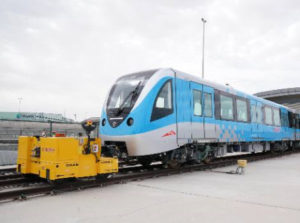Four trial phases to get trains operational
Mattar Mohammed Al Tayer, Director-General and Chairman of the Board of Executive Directors, Roads and Transport Authority (RTA) announced the arrival of all the 50 new Dubai Metro trains.

Fifteen of these trains are designated for serving Expo 2020, and the remaining 35 trains are meant to improve the level of service of the existing Dubai Metro.
“Seats in the new trains are transversal in the Gold Cabin and longitudinal in both the Silver and the Women & Children Cabins. This redistribution of seats enables the increase of each metro train capacity by 8% from 643 riders to 696 riders,” commented Al Tayer.
The new carriages are configured to suit the use of people of determination and the smooth entry and exit of riders. Seats were redistributed at the two sides of the train and the gangway connecting between carriages has been widened.
The exterior shape of the new Dubai Metro trains was left unchanged to maintain the design identity of the Dubai Metro and its familiar colours to the public,” explained Al Tayer.
The new trains are deployed at the Dubai Metro Depots at Al Rashidiya and Jebel Ali. RTA is currently conducting operational tests of trains on Route 2020 of the Dubai Metro Red Line. Tests consist of four phases.
Phase 1 constitutes ‘Static Tests’, where a motionless metro carriage is placed on the track for carrying out a series of tests including communication systems, automated train control systems, electrical and power supply system among other tests.
Phase 2 is the ‘Dynamic Tests’, which covers a series of onboard tests on a train in motion. Tests on the rolling stock cover electrical motors, brake systems, and related mechanics.
Phase 3 relates to ‘Operational Tests’ to verify the system’s reliability and stability. These tests are key phases of the project and start after the completion of tests and the integration of the entire systems.
Phase 4 constitutes ‘Operational Trials’ conducted by the metro operator. It aims at verifying the readiness of the operator before the start of the actual operation of the service.
